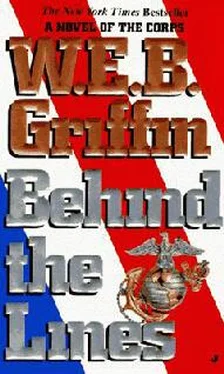W.E.B. Griffin - The Corps VII - Behind the Lines
Здесь есть возможность читать онлайн «W.E.B. Griffin - The Corps VII - Behind the Lines» весь текст электронной книги совершенно бесплатно (целиком полную версию без сокращений). В некоторых случаях можно слушать аудио, скачать через торрент в формате fb2 и присутствует краткое содержание. Жанр: prose_military, на английском языке. Описание произведения, (предисловие) а так же отзывы посетителей доступны на портале библиотеки ЛибКат.
- Название:The Corps VII - Behind the Lines
- Автор:
- Жанр:
- Год:неизвестен
- ISBN:нет данных
- Рейтинг книги:3 / 5. Голосов: 1
-
Избранное:Добавить в избранное
- Отзывы:
-
Ваша оценка:
- 60
- 1
- 2
- 3
- 4
- 5
The Corps VII - Behind the Lines: краткое содержание, описание и аннотация
Предлагаем к чтению аннотацию, описание, краткое содержание или предисловие (зависит от того, что написал сам автор книги «The Corps VII - Behind the Lines»). Если вы не нашли необходимую информацию о книге — напишите в комментариях, мы постараемся отыскать её.
The Corps VII - Behind the Lines — читать онлайн бесплатно полную книгу (весь текст) целиком
Ниже представлен текст книги, разбитый по страницам. Система сохранения места последней прочитанной страницы, позволяет с удобством читать онлайн бесплатно книгу «The Corps VII - Behind the Lines», без необходимости каждый раз заново искать на чём Вы остановились. Поставьте закладку, и сможете в любой момент перейти на страницу, на которой закончили чтение.
Интервал:
Закладка:
He joined Marine Corps Reserve Battalion 14, based in New Orleans, Lou-isiana, as a platoon leader, even though this meant an overnight train ride-at his own expense-each way once a month from his home in Palm Beach, Florida, for the weekend training program. After two years of service with the battalion, he was promoted first lieutenant.
When he was not training with The Marine Corps, he was Vice President, Domestic Transportation, for the Brownlee Fruit Company (founded by his grandfather, Matthew J. Brownlee). The firm imported bananas-their own production and brokered-from Nicaragua, Honduras, Panama, and El Salva-dor. His father was currently President, and his older brother, Matthew J. Brownlee III, was Vice President, Production.
What his title meant was that his father had put him to work under an expe-rienced longtime traffic manager, as a way to learn the business. Bananas were off-loaded from Brownlee ships at Port St. Lucie, Florida; Mobile, Alabama; and New Orleans, Louisiana. His job was to ensure the smooth flow of the bananas either to regional distribution centers or to the ultimate retailers.
He liked the challenge of quickly and economically moving vast amounts of bananas-they are, of course, highly perishable-from the off-loading port to their destinations, while keeping them as fresh as possible. At the same time, the intricacies of interstate motor freight laws, tariffs, and the like were rather fascinating.
Since the whole idea was to teach him the business, he also spent a good deal of time in Central America with his brother. Matthew, who was fifteen years older than he was, devoted his attention pretty much equally to showing Jim the plantation operations and trying to prevent him from giving in to what the Episcopal Church terms the sinful lusts of the flesh with dark-skinned na-tive girls.
On 15 October 1940, President Roosevelt ordered the mobilization of Ma-rine Reserve Battalions, which did not surprise Jim Brownlee. On April 9, Ger-many had occupied Denmark and invaded Norway. The next month, Germany invaded Belgium, the Netherlands, and Luxembourg. British Prime Minister Neville Chamberlain, who had promised "Peace In Our Time," resigned 11 May, and Winston S. Churchill took his place.
What was left of the British Army after the German Blitzkrieg across France was evacuated from Dunkirk on 4 June; and just over a week later, the German Wehrmacht goose-stepped down the Champs Ely sees. On 22 June, the French surrendered to the Germans.
In July, a Marine lieutenant colonel who spoke to Jim's reserve battalion in New Orleans brought them up to date on the military picture as the Marine Corps saw it. He mentioned that as of 30 June, the total strength of the USMC was 1,732 Officers and 26,545 Enlisted Men.
He didn't say that the Marine Reserve was about to be mobilized, but he did say that there were obviously not enough Marines in uniform for the pre-sent circumstances.
Jim Brownlee reported for active duty with his reserve battalion to Marine Base Quantico, Virginia on 1 November 1940. Within a week of their arrival, the battalion was broken up, and its members were scattered all over the world, wherever Marines were serving.
A Marine Personnel Officer, a major whom Jim correctly suspected was curious how a twenty-four-year-old had become a vice president of a large cor-poration, questioned him at some length about his duties, and then sent him to see a full colonel, who was the G-4 (Supply) Officer at Quantico.
The Colonel questioned him even more intensively about his knowledge of what the Marine Corps called "Transport." Apparently satisfied with the answers, he told Jim he had been looking for someone with his qualifications, and as of that moment he could consider himself assigned to the G-4 Section as an Assistant Transportation Officer.
Jim's protests that he was trained as an infantry platoon leader were met with the observation that in the Colonel's experience good Marine officers went where they were sent and did what they were told to do, without com-plaint.
The year between Jim's call to active duty and Pearl Harbor went quickly, and he took a certain satisfaction from his work. He was more than a little surprised to learn how much truck operators serving the Marines had been able to get away with before he laid his expert eye on the invoices they had ten-dered.
He received during that year three letters of commendation for his official file and a wholly unexpected promotion to captain.
The attack on Pearl Harbor surprised him, for a couple of reasons. For one thing, he did not think the Japanese had the technical capability to strike with such strength at such a great distance. For another, though a surprise attack on the United States was possible, in his view, he thought it would probably come on the Panama Canal, either from the Germans in the Atlantic or the Japanese in the Pacific, or conceivably both.
On 8 December, he applied for transfer to duty with troops. His letter came back within a week, denied. He applied again thereafter on a monthly basis, and on a monthly basis his request was denied. In April 1942, he was promoted major. The ceremony was held in the office of the Commanding General. After offering his congratulations, he said he hoped it would mean the end of the monthly requests for transfer.
In May 1942, a memorandum from Headquarters USMC crossed Major Brownlee's desk. Applications were being solicited from officers for a non-specified duty of an intelligence nature. Preference would be given to those with fluency in one or more foreign languages, and/or who had spent time out-side the continental United States.
He submitted his application and promptly forgot about it, sure that it would suffer the same fate as his requests for transfer to duty with troops.
Two weeks later, his orders came through. He was transferred to some-thing called the Office of Strategic Services and ordered to report within forty-eight hours to the National Institute of Health Building in Washington, D.C.
There he was interviewed by another board of officers. This one consisted of three men in civilian clothing; two of them spoke Spanish. At the conclusion of the interview, one of the Spanish speakers shook his hand, offered his name, and said, "Please give my best regards to your brother. But don't tell him where, or under what circumstances, we bumped into each other."
That same afternoon, Jim Brownlee was transported in a Buick station wagon to the former Congressional Country Club to begin training.
The training was difficult, but not nearly so difficult for Major Brownlee as it was for some of his fellow trainees who had entered the OSS directly from civilian life-he had taken pains to keep himself in shape at Quantico and thereafter. Two fellow trainees had never held a weapon in their hands before coming to the Country Club.
As the training proceeded, he began to wonder where he would be as-signed. He gradually came to the conclusion that because of his fluency in Spanish, it would either be in Spain or somewhere in South America. In Spain, the policy of the United States Government was to keep Generalissimo Franco, known as "El Caudillo," neutral. If South America, he rather suspected he would be in Argentina, where the military-dominated government was in ev-erything but name an ally of the Germans. It was common knowledge around the Country Club that both the OSS and the FBI were deeply involved in Ar-gentina, Chile, Paraguay, and Uruguay.
There was a decent library at the Country Club, and Jim Brownlee spent many of his evenings trying to learn as much as he could about the history and politics of South America. He felt he would be given an assignment shortly after he completed the training and then got past the Final Board.
That didn't happen. Despite his "Agent, awaiting assignment" status, no assignment was forthcoming. What did happen was that someone in the office realized that he was the senior Marine officer present at the Country Club, and consequently, that administrative responsibility for all Marine Corps personnel assigned to the OSS was logically his.
Читать дальшеИнтервал:
Закладка:
Похожие книги на «The Corps VII - Behind the Lines»
Представляем Вашему вниманию похожие книги на «The Corps VII - Behind the Lines» списком для выбора. Мы отобрали схожую по названию и смыслу литературу в надежде предоставить читателям больше вариантов отыскать новые, интересные, ещё непрочитанные произведения.
Обсуждение, отзывы о книге «The Corps VII - Behind the Lines» и просто собственные мнения читателей. Оставьте ваши комментарии, напишите, что Вы думаете о произведении, его смысле или главных героях. Укажите что конкретно понравилось, а что нет, и почему Вы так считаете.










